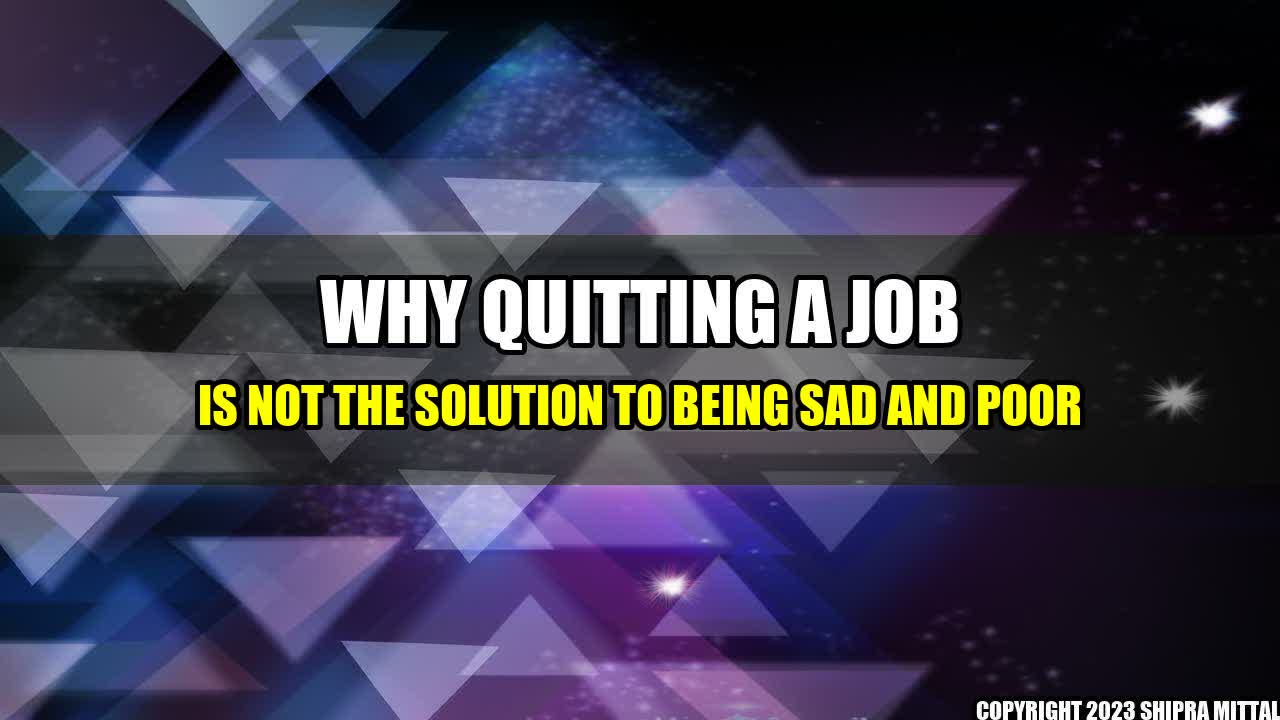Many people think that quitting their job is the answer to their problems when they feel sad or financially troubled. This belief is reinforced by the idea that we should pursue happiness no matter what and that our job should be fulfilling. While it is true that our job plays a significant role in our well-being, it is not the only factor that impacts our life satisfaction. In fact, quitting a job without a plan B can lead to even more problems in the future. In this article, we will explore why quitting a job is not always the best solution.
Real-life Examples
Let's take the examples of two companies, Apple and Microsoft. Both of them are considered to be among the best places to work in the world, yet they have employees who feel sad or unfulfilled. Even the most ideal job cannot guarantee happiness because it depends on various factors such as personal values, beliefs, relationships, health, and life circumstances.
For instance, consider the case of an Apple employee named John. John joined Apple as a software engineer four years ago because he was passionate about technology and believed in the company's vision. He enjoyed working with his team, learning new skills, and contributing to innovative projects. However, over time, he started feeling stressed and burned out due to long hours, tight deadlines, and high expectations. He also faced personal challenges such as a divorce and a health issue that affected his performance. John began to lose interest in his job and felt sad and unproductive. He thought about quitting many times but was afraid of losing his income and reputation. He also did not know what else he could do or where he could go.
Meanwhile, at Microsoft, there was a marketing manager named Jane who was facing similar struggles. Jane loved her job at first and excelled at it. She was admired by her colleagues and recognized for her creativity and leadership. However, after a while, she started feeling bored and unchallenged. She wanted to explore new opportunities and express her true self, but she felt stuck in her role and the company culture. She also felt underpaid and undervalued compared to her peers. Jane tried to negotiate with her boss and apply for other positions within Microsoft, but she did not get the desired response. She felt sad and helpless and contemplated quitting.
Would quitting their jobs have been the best solution for John and Jane? Let's find out!
The Risks of Quitting
Many people underestimate the risks involved in quitting a job, especially in today's economy where the job market is highly competitive and uncertain. Quitting a job without a plan B can have several negative consequences, such as:
- Financial insecurity: losing a stable income can lead to debt, eviction, or poverty, which can worsen one's mental and physical health.
- Career setback: quitting a job without a backup plan can leave a gap in one's work history and make it harder to find another job, especially if one's skills and experience are not updated.
- Emotional distress: quitting a job can cause stress, guilt, regret, and social isolation, especially if one had strong relationships with colleagues and liked the work environment.
- Identity crisis: quitting a job can challenge one's sense of purpose, meaning, and self-worth, especially if one had identified oneself with the job title or the company brand.
- Missed opportunities: quitting a job can limit one's exposure to new challenges, skills, networks, and experiences that could have led to personal and professional growth.
As we can see, quitting a job should not be taken lightly, and it should be done only after careful consideration and preparation. What are some alternatives to quitting? Let's explore!
Alternative Solutions
If our job is not making us happy or fulfilling, we should not immediately give up on it but rather try to fix the issues that are causing our dissatisfaction. Based on the examples of John and Jane, here are some alternative solutions:
- Talk to a counselor or a coach: seeking professional help can provide us with clarity, self-awareness, and coping skills to deal with our personal and work-related problems, and make informed decisions.
- Negotiate with the employer: communicating our concerns and needs to our boss or HR department can lead to changes in our schedule, workload, salary, benefits, or assignments, and make our job more satisfying.
- Seek a lateral or vertical movement: exploring other roles or departments within the same company or industry can expose us to different perspectives, challenges, and skills, and broaden our horizon.
- Take a sabbatical or a break: taking time off from work, whether it is a long vacation or a temporary leave, can help us recharge, reflect, and re-evaluate our priorities and goals.
- Start a side hustle or a passion project: pursuing a hobby or a business idea on the side of our job can give us a sense of purpose, creativity, and autonomy, and open up new opportunities.
By implementing these solutions, John and Jane could have addressed their concerns and found a way to improve their work-life balance and sense of fulfillment. However, if none of these solutions work, quitting a job can still be an option, as long as it is done strategically and with a backup plan.

Akash Mittal Tech Article
Share on Twitter Share on LinkedIn